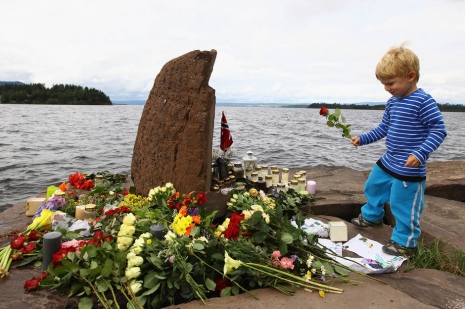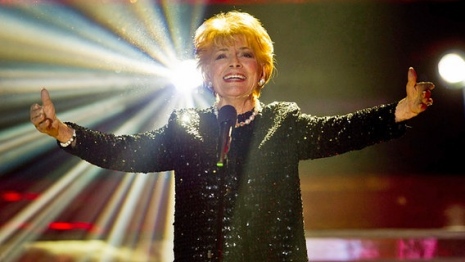There is an undeniable sense of patriotism and national pride tied into the Eurovision Song Contest. From “De vogels van Holland” to “I Love Belarus”, countries have often tried to share a bit of their culture via the annual three-minute window (or, if they’re lucky enough to reach the Finals, the same three minutes twice). But what happens if the person representing a country doesn’t quite fit into the traditional (often stereotypical) mold of what a Turk, a Norwegian, a Ukrainian, or any other nationality is ‘expected’ to be?
Is Eurovision about bringing people of all nations together, or is it about showing off a constructed image of what a country is expected to look like?
The colour barrier at Eurovision was smashed nearly fifty years ago when Anneke Grönloh, born in the Dutch East Indies, performed for the Netherlands in 1964. Surinamese-Dutch singer Milly Scott followed two years later. Since then, the cultures and languages of minority or immigrant groups have been occasionally represented or recognized on the Eurovision stage, from the Bretons and Corsicans in France, to Estonia’s Võro-speaking community, to 1980’s “Sámiid Ædnan” for Norway.
Even this year, Russia will be featuring the Udmurt culture and language, spoken by less than half a million native speakers. For the first time, a native of Kosovo will take the stage for Albania in Rona Nishliu. Finland will send a song in Swedish, the mother tongue of only about 5.5% of the nation’s citizens. Bulgaria’s Sofi Marinova is part of the country’s Roma population, and will include a phrase of Romani in her entry “Love Unlimited”, alongside many other languages.
Generally speaking, incorporating these minority communities on the Eurovision stage induces little more than an idle curiosity among international fans, if any attention at all. However, on occasion, a country’s choice can cause controversy within that nation’s borders.
When Turkish broadcaster TRT selected Izmir-born alt-rocker Can Bonomo to represent the country in Baku, there was a somewhat louder-than-normal outcry at the choice. It wasn’t because he was a little-known performer, it wasn’t because he wasn’t Atiye or Hadise, and it wasn’t because of his eclectic style of music. Among some conservatives, it was because he wasn’t “Turkish enough”. Can is a member of Turkey’s small Jewish community, present in the country since the Spanish Inquisition over half a millenium ago. Turkey technically separates the entities of religion and state, and the vast majority of Turks don’t seem to care about Can’s religious upbringing.
However, the fact that he is part of a religious minority (about 0.03% of the nation’s mostly Muslim population) has raised a few hackles among some pundits. Can himself has generally stayed away from the debate, asserting that “I am Turkish and I am representing Turkey. I will go out there with the Turkish flag and represent Turkey. I am an artist, a musician. That’s all that everybody needs to know.”
A similar reaction followed the selection of Gaitana’s “Be My Guest”. Soon after winning her country’s National Selection, right-wing Svoboda Party member Yuriy Syrotyuk criticized the choice, claiming that the 32-year old “is not an organic representative of the Ukrainian culture”, and suggested that by sending Gaitana to represent the country, they’d be somehow distancing themselves from the image of being “European”.
Gaitana, the daughter of a Ukrainian mother and Congolese father, was born in Kiev, spent her toddler years in Africa, but moved back to Ukraine at the age of five. She had represented her country on an international stage before, as a competitive table-tennis player, but somehow, it was the decision to send her to Eurovision (the choice of broadcaster NTU’s jury as well as the second choice of the Ukrainian voting public) that set Syrotyuk on edge. Despite the fact that Gaitana’s song, “Be My Guest” is about presenting a warm, welcoming face to visitors coming into the country for the European Football Championships this summer, a single voice from a political party appears to be counteracting that message, even against one of Ukraine’s own citizens.
Backlash from this incident seemed to be directed towards Syrotyuk, rather than Gaitana, so it appears that this opinion is isolated.
But last year, we all witnessed a chilling reminder of how xenophobia could result in something terrible, even when carried out by a single individual. As people from around the world tried to wrap their heads around the horror that took place in Oslo and Utøya Island, where a single madman left 77 dead and 151 injured, a haunting passage from the perpetrator’s journal was released to the media.
Anders Behring Breivik, a militant nationalist, wrote on May 14:
It’s the Eurovision finale today. I just love Eurovision … ! It’s a lot of crap music but I think it’s a great show all in all…My country has a crap, politically correct contribution as always. An asylum seeker from Kenya, performing a bongo song, very representative of Europe and my country…
He wrote this in reference to Nairobi-born singer Stella Mwangi and her entry “Haba Haba”, which had won the Norwegian National Final by a landslide earlier that year. It makes me wonder what he had thought when Alexander Rybak (himself also an immigrant, from Belarus) had won Eurovision for Norway two years earlier. Breivik’s views are, of course, incredibly isolated, and not shared by the vast majority of the Norwegian public.
When it was time for Norway to select its representative for 2012, it was Iranian-born singer Tooji who was overwhelmingly selected to bear the flag of his adopted country in Baku.
As we all know, the Eurovision Song Contest has expanded immensely since Lys Assia took the stage at that seven-nation-strong event in 1956, as has the notion of “Europe” as a whole. Walls have fallen, borders have moved, and the idea of what it means to be “European” has changed. It’s a staggering thought to think that sixteen of the forty-two nations participating in 2012 didn’t even exist when the chanson singer took the stage for that first victory reprise.
When Marcel Bezençon established the Eurovision Song Contest, he envisioned it as a way to bring nations together through the medium of music and entertainment, especially with the Second World War hovering as a moderately recent memory in the minds of Europeans. It was a method of showing that despite the distance and history that may divide people and cultures, music was a way to bring us all back together.
What some people fail to realize, however, is that the idea of “bridging gaps” doesn’t only apply on an international level. It’s just as valid and necessary a point to remember in regards to the domestic realm, as well.











It’s interesting that Ukraine have opted for their first mixed race representative, in the same year that they are hosting Euro 2012, after concerns were raised about racism in the country…
Estonia’s 2001 act is an interesting one. An ethnic Estonian, an Aruban immigrant and ethnic Russian speakers on backing vocals – a construction of multiculturalism on the Eurovision stage, the song itself being called “Everybody”.
Racism has no place in Eurovision, it is sad when people don’t like it when their country is represented by someone who does not fit a certain ideal that one person holds. Eurovision is for people 3 nights that they see the rest of Europe and their culture, and if Eurovision can break down barriers with the idea of what is the correct race for some nations. Then it has accomplished somthing.
The UK’s first black singer didn’t take to the stage until 1998! I don’t think that was particularly controversial though.
Racism is a huge problem in Eastern Europe and so I guess it’s inevitable that it will spill over into Eurovision too.
The Norway massacre shows that it poses a problem for us all, East and West.
It doesn’t help that one can still encounter forms that use “European” or “Caucasian” as racial descriptions when they mean “White.”
I’m fortunate to live in a country where no racial type is overly representative of national identity, consequently such extremists can’t even appeal to the idea of an “organic” race.
How exactly can an article on Race and Ethnicity in the Eurovision Contest FAIL to mention the Native Appropriation fest jerkery that is this year’s competition entry from the Netherlands, Turkish-Dutch singer Joan Franka?
P.S. The Austrian entry this year (IMO the worst song this year) also mentions Native Americans in a disrespectful manner (translated): “We are hipster party Indians with feathers on our head”.
One last point: What about Indonesian French Anggun who is France’s entry this year?